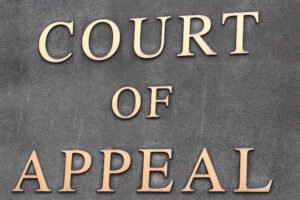In Nevada criminal law, an “appeal” is a legal process that allows you to challenge your guilty trial verdict and/or sentence by asking a higher court to review your case.
If the appeals court finds “reversible errors” in your case, it can remand the case for a new trial or sentencing hearing. In some criminal cases, the appeals court will even reverse the final judgment and vacate the conviction for good.
In this article, our Las Vegas criminal defense attorneys answer these frequently asked questions:
- 1. Is an appeal like a new trial?
- 2. What are the grounds for a Nevada appeal?
- 3. Which court do I appeal to?
- 4. How long do I have?
- 5. How does the appeals process work in Nevada?
- 6. How long does the appeals process take?
- 7. What if I lose?
- 8. Can I appeal my guilty plea?
1. Is an appeal like a new trial?
No, a criminal appeal in Nevada is simply a review of your trial. The appellate court looks only at the records and the transcripts of what occurred in trial court.
During an appeal, your attorney may not introduce new evidence or testimony
- in your appellate brief (the document explaining to the court why you should win an appeal), or
- during oral arguments (which is when the appellate judges ask your attorney questions about your brief)1
You can ask for a new trial, but that is an entirely separate procedure usually done before filing an appeal. Plus, judges rarely grant new trials because they are hesitant to admit any errors that occur in their court. For more information, go to our article on motions for a new trial in Nevada.

Appellate courts can reverse, remand, or affirm the lower court’s decision.
2. What are the grounds for a Nevada appeal?
There are many possible grounds for a successful criminal appeal in Nevada, such as:
- the judge made an error;
- the prosecutors committed misconduct;
- the jurors were given incorrect jury instructions;
- your attorney was incompetent (“ineffective assistance of counsel“); and/or
- there was insufficient evidence to justify a conviction.
Your criminal appeals lawyer’s job is to comb through your “trial record” for every legal error that may have denied you your Constitutional right to a fair trial.2
3. Which court do I appeal to?
If your trial was for a misdemeanor, then you may appeal to the district court in your county.
Example: If you were convicted of DUI in Las Vegas Justice Court, then you could appeal to Clark County District Court/Eighth Judicial District Court.
If your trial was for a felony or a gross misdemeanor, then you may appeal to the Nevada Supreme Court – the highest court in the state.
If the Nevada Supreme Court finds against you, you can petition the Supreme Court of the United States – the highest court in the country. Though they hear very few cases, and chances are they will not entertain your appeal.
For more information, go to our article on felony and gross misdemeanor appeals.3
Federal Court
If your case was in federal court (the United States District Court – District of Nevada), then your attorney may appeal to the Ninth Circuit Court of Appeals.
Failing that, your final resort is the United States Supreme Court. However, as discussed above, chances are slim that they will hear your case.
For more information, go to our article on Nevada federal appeals law.
4. How long do I have?
Your deadline for appealing your criminal conviction depends on which Nevada court your trial was in:
- county district court: 30 days after you were convicted.
- justice court: 10 days after you were convicted.
- federal district court: 14 days after you were convicted.
If you miss your deadline to appeal, you lose the right to appeal.4
5. How does the appeals process work in Nevada?
First, your Nevada criminal appeals attorney files a “notice of appeal” with the court where your trial occurred. Then, the trial court will file your trial’s “record” (the transcripts) with the appellate court.
At that point, your attorney usually has 120 days to review the record and compose an “appellate brief,” a lengthy document outlining all the legal arguments and case citations supporting why you should win on appeal.
After your attorney submits the appellate brief, the state’s lawyer (called the “district attorney”) will file an “opposition” challenging your arguments. In some cases, your attorney may be allowed to submit a “reply brief” in response to the opposition.
Depending on the case, your appeals lawyer may be allowed to give an “oral argument” before the appellate judges to supplement the brief. Afterward, the judges will review the briefs and oral arguments (if any) and deliver a decision in the form of a written opinion.5
6. How long does the appeals process take?
Fast-track appeals are typically decided within only three months. Otherwise, an appeal can take over a year. All appeals in Nevada are automatically “fast-tracked” unless
- you were sentenced to life in prison, or
- you specifically request a full-length appeal.
The downside of fast-track appeals is that
- your “appellate brief” is limited to only 16 pages, and
- your attorney usually may not give an oral argument in front of the judges.
However, the court may ask your attorney for a longer brief if they believe your grounds of appeal warrant a more in-depth review.6

Oral arguments are an opportunity for the appellate judge to ask your attorney questions.
7. What if I lose?
If you lose your appeal in the Nevada Supreme Court and remain incarcerated, you have one year to file a writ of habeas corpus. This is a type of post-conviction relief that allows you to challenge your conviction and imprisonment by raising errors that occurred during the trial.
As opposed to appeals, writs of habeas corpus may introduce new evidence not raised at trial.7 Though as with appeals, habeas writs are very technical – so do not attempt to file one on your own without a lawyer.
8. Can I appeal my guilty plea?
Yes, but you will likely lose unless you can show the plea was unconstitutional or otherwise illegal.8
For more information, go to our article on withdrawing a guilty plea in Nevada.
Learn more about the Nevada Supreme Court in Las Vegas and the Nevada Supreme Court in Carson City.
In California? Visit our page on appealing California criminal convictions.
Legal References
- NRS 177.
- See, for example, State v. Shade (Nev. 1995) 900 P.2d 327; Valdez v. State (Nev. 2008) 196 P.3d 465.
- NRS 177. About a third of cases are instead routed to the Nevada Court of Appeals instead of the Nevada Supreme Court.
- NRS 177.055; NRS 189.010; Federal Rule of Appellate Procedure 4. Note that municipal court convictions can also be appealed to the local district court.
- NRS 177. Nevada Rule of Appellate Procedure 31.
- Nevada Rule of Appellate Procedure 3C.
- NRS 34.360 – NRS 34.830.
- NRS 177.015(4).

